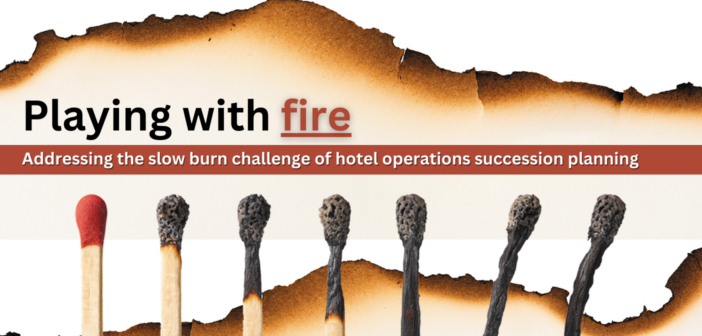Addressing the slow burn challenge of hotel operations succession planning
For the decade ahead, hotel companies face a generational challenge – namely, a lack of strong succession planning to protect a property or brand’s legacy. But, because this problem isn’t as clearly defined as the before and after of ‘The Great Resignation,’ senior teams may not prioritize a slow burn issue like the gradual depletion of bright young minds from the industry as these candidates opt for other career paths due to a variety of intermingled factors.
This is precisely why succession planning should be addressed now, whereupon cultural and operational changes will then have a progressively positive effect on a hotel’s ability to retain talent even as the industry confronts a series of abrupt demographic changes.
“One thing we all know well is that the industry must be agile and able to pivot quickly at all times,” commented Janis Clapoff, the managing director of El Encanto, a Belmond Hotel in Santa Barbara, California. “Succession planning prepares us for a quick response and gives us that resilience during challenging times. At Belmond, we’ve identified the importance of mentoring in our organization to preserve brand integrity and reputation. Mentoring also shows high-performing employees that the company is interested in their growth and development.”
SUCCESSIONAL CAUSES
For context, it’s important to first understand why large swaths of the hospitality industry may continue to suffer from ongoing labor shortages, both for frontline staffers as well as for managers possessing strong enough skills and tenacity to one day become executive leaders. Knowing the causes helps define the framework for effective actions.
As an opening caveat, though, this is a complex situation that varies by location and (gasp!) there’s always room for error regarding the durability of these factors. Actually, it would be fantastic if these predictions ultimately prove false because if all these causes compound, the result will be a dire brain drain over the long run.

NEW AFRICA/SHUTTERSTOCK.COM, NICK N A/SHUTTERSTOCK.COM
Starting back from the opening paragraph, while the media alerted the world during the latter half of the pandemic about this Great Resignation, for hotels in many markets a better label would have been ‘The Great Reskilling,’ as the furloughs combined with lingering fears over COVID-19 spread and the haphazard stop-start nature of the reopening efforts compelled many to pivot and retrain for other jobs within the broader service sector.
Concurrently and more systemically to hospitality, salaries just can’t compare to other industries like finance, technology, or real estate. Now, well into the post-pandemic era, every company must also contend with the dreaded ‘H’ word – hybrid. While other industries by their very nature can better facilitate remote work and flexible hours, so much of hotel operations is hands-on and in-person that this is impossible for us to do on a consistent basis.
Next, when you consider the mindsets of generations Y and Z, surveys reveal that, on average, these younger cohorts feel strongly about corporate values related to ESG (environmental, social, and governance) and DEI (diversity, equity, and inclusion), and are willing to sacrifice higher compensation to work for a company that aligns with their beliefs. Particularly as the climate crisis deepens and travel is singled out as a primary contributor of carbon emissions, hotels that aren’t sustainable may soon be deemed as undesirable places to apply for a job, with any robust monetary incentive met only with apathy.
GENERATIONAL SOLUTIONS
Whichever way you feel on these issues, it’s much tougher to fight the river than to flow with it. That is, for every one of the causes there’s a feasible solution, albeit one that’s never a quick fix but part of an ongoing virtuous circle of change management. Getting back to basics means getting down to core values and firmly embedded processes.
“Initially, we consider the business needs. We identify those handful of key positions that need a robust plan in place where an absence would present significant operational issues if the position became vacant,” said Stephen Johnston, the managing director for The Boston Harbor Hotel. “After the business needs have been addressed, we consider the needs of the individuals. It’s never a precise science. Some managers are happy with where they are; not everyone aspires to be a general manager. Others are highly ambitious and feel the need for continuous upward movement. If these signs – a willingness to take on more responsibility – are ignored and individuals don’t receive opportunities to grow, they’ll lose faith in the business and seek opportunity elsewhere.”
In contrast to Johnston’s systematized approach, it’s common to hear complaints about the perceived entitlement of younger hires who deem themselves worthy of being a GM within six months of onboarding. While this may be a result of growing up in an era of pervasive social media and instant gratification, it’s critical to lay out the lines of personal progress and expectations more transparently for performance. From there, continuing professional development with gamified elements combined with the personal touch of direct mentorship will more than offset any communication or work style differences between novice and veteran.
“Succession planning starts with knowing your team and their aspirations,” said Vikram Sood, managing director of The Inn at Rancho Santa Fe, north of San Diego, CA. “Some activities to encourage this effort include a formal mentor-mentee program with monthly check-ins to allow leaders to really understand the team members who have an aspiration to grow, the use of a bench strength worksheet that tracks all the information surrounding a team member’s growth aspirations, and providing honest feedback throughout the year. Never just use the formal review system.”
TECHNOLOGICAL SUCCESSION
The cultural side is a process, but so much of hospitality nowadays involves an interconnected web of management systems that it would be remiss to exclude a minor note on technology’s role in succession planning. Namely, there are two critical progressions at play that will help hotels improve their talent retention efforts.
First, migration to the cloud means there is less loss of records when a manager leaves or during a turnaround situation because the information is restored remotely instead of offline within hard drives and Excel files. This means new personnel or recruited teams can have immediate access to accurate metrics or forecasts and are never demoralized by having to sort through inconsistencies or devote significant time to data re-entry.
Second and simultaneous to the implementation of cloud-based platforms, various disparate vendors are amalgamating their graphical user interfaces or developing strong data feeds into other systems. The result is younger hires who are accustomed to sleek, intuitive systems such the apps with which they’re already familiar on their phones don’t feel bogged down by having to cross-check a dozen screens every workday – an effect now described as “dashboard fatigue.” Instead, they can have all the insights they need to plan their next move all in one place.
Ultimately, the slow burn challenge of planning for the next generation of hoteliers may be rooted in organizational culture, but investments in technology cannot be ignored as a contributing factor. Every hotel is different, so the exact needs are also different. Nevertheless, having an outlook of constantly supporting young hires and actively listening to their needs is what ensures that your property or brand’s legacy is protected for years to come.


 Together,
Together, 

